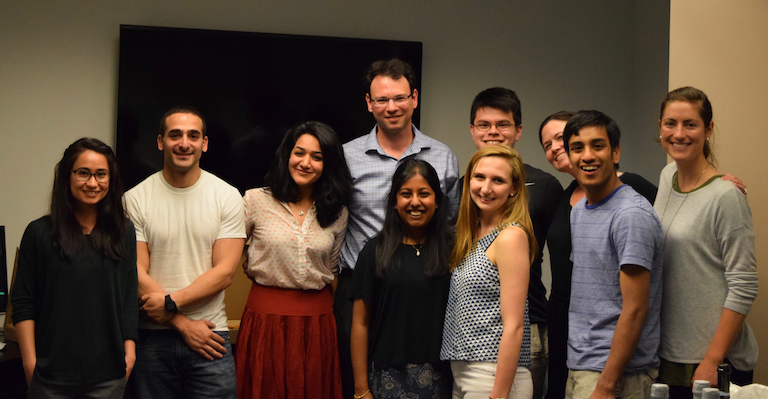Mandal Wins Goldwater Scholarship

Ayan Mandal (C’18), second from right, is pictured here with members of the Cognitive Recovery Lab. Mandal is the first Georgetown student in three years to be awarded the prestigious Goldwater Scholarship. (Photo courtesy Ayan Mandal)
June 12, 2017 — This spring, neurobiology major Ayan Mandal (C’18) was awarded the Barry Goldwater Scholarship, one of the country’s most prestigious awards for students studying mathematics, engineering and the natural sciences.
Each university is allowed to nominated up to four sophomores and juniors annually for the scholarship — Patrick Mulcahey (C’18) also earned an Honorable Mention this year — and around 300 students in total are chosen to receive it. Applicants are evaluated based largely on research experience and interest in pursuing a doctoral degree in the natural sciences, though grades, essays, and recommendations also factor in. Mandal is the first Georgetown student to receive the award since Sarah Waye (C’15) in 2014.
Mandal, a native of Rocky Point, N.Y., arrived on the Hilltop intending to study linguistics. Though he would end up choosing another route, he still credits Dr. Amir Zeldes’ Computational Corpus Linguistics class as instrumental in teaching him the importance of study design when conducting seemingly “objective” data science.
“When you’re doing data science, you have to be aware that you’re choosing how to count things,” Mandal said. “When you say ‘this is what we count as someone detecting an error,’ how we choose those definitions has an impact on what our results look like.”
After realizing he was more interested in the neurological side of language than the study of linguistics, Mandal chose to double major in neurobiology and biological physics. A self-taught programmer, he now applies computer science concepts to medical problems in Georgetown’s Cognitive Recovery Lab. Working alongside Dr. Peter Turkeltaub, he primarily studies aphasia, the language deficit that often occurs as a result of stroke-induced brain damage.
“We found that damage to frontal white matter tracts will negatively predict self-monitoring — people with damage to the white matter in their frontal lobes will have trouble detecting errors in their speech,” Mandal said.
The lab’s research is notable because neuroscientists have long disagreed on how people know when to correct themselves: Some thought there was a mechanism in the language center that allowed the brain to identify errors almost instantaneously after making them, while others suspected self-correction came from hearing one’s own erroneous speech.
The Cognitive Recovery Lab’s findings — specifically, that frontal lobe damage affects this process — endorse the former view. Mandal presented the lab’s findings last year at the American Society for Neurorehabilitation Conference in San Diego.
“It’s a pretty cool finding, because that’s been a hotly debated topic in the literature,” Mandal said.
Mandal has also researched the brain’s white matter network on a larger scale, examining how damage to white matter affects cognition. In collaboration with researchers at the University of Pennsylvania, he studied the different neural networks necessary for naming an object via speech or in writing.
“Naming while speaking depends on a network of tracks within the left temporal lobe — that, we expected,” Mandal said. “But we also found that the network of tracks that we depend on while naming via writing extends into the right hemisphere as well.”
Mandal admits to occasionally feeling uncomfortable applying his entirely self-taught programming skills to medical research. But with practice has come confidence, and he expresses optimism about the future of machine learning in medicine — a future he thinks will turn much of the field on its head.
“We’ve had all these old diagnoses and ways we think that disorders should be defined,” Mandal said. “But I predict that a lot of this will be revamped in the coming decades. It’ll be more based on data collection and classification than on what older physicians traditionally thought. So I see potential for a lot of overlap between computer science and medicine, and I hope to be someone who helps bridge that gap.”
Since his freshman year, Mandal had thought he might pursue an M.D./Ph.D. in either neuroscience or biomedical engineering. But it was only over the past year that he realized it was his true calling, and the Goldwater Scholarship has helped solidify his confidence in this career path.
“Whenever you’re pursuing something as competitive as an M.D./Ph.D., there are going to be periods of self-doubt, where you’re asking ‘Am I really good enough to do this?’” Mandal said. “The Goldwater Scholarship has emboldened me, showing me that this is something I really am good at. I obviously think my work is valuable, but it’s good to hear that others see it the same way.”
Outside of his research, Mandal is a regular contributor to The Hoya, writing a biweekly column on neuroscience and covering topics as diverse as LSD and Aristotle’s theory of the brain.
He’s also a member of the Carroll Fellows Initiative, Georgetown’s flagship program for academically talented and ambitious undergraduates. He credits his Carroll Fellows experience with helping him narrow his academic focus to neuroscience.
“It’s exciting — it’s a topic that people have been asking questions about for 2000 years, and we’re just now starting to really understand it,” Mandal said.